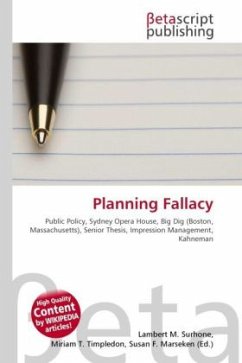High Quality Content by WIKIPEDIA articles! The planning fallacy is the tendency to underestimate task-completion times. Real-life examples in public policy may include the construction of the Sydney Opera House and the Big Dig, both of which ran many years past their planned schedule. In a 1994 study, 37 psychology students were asked to estimate how long it would take to finish their senior theses. The average estimate was 33.9 days. They also estimated how long it would take "if everything went as well as it possibly could" (averaging 27.4 days) and "if everything went as poorly as it possibly could" (averaging 48.6 days). The average actual completion time was 55.5 days, with only about 30% of the students completing their thesis in the amount of time they predicted. One explanation, focalism, may account for the mental discounting of off-project risks. People formulating the plan may eliminate factors they perceive to lie outside the specifics of the project. Additionally, they may discount multiple improbable high-impact risks because each one is so unlikely to happen.








